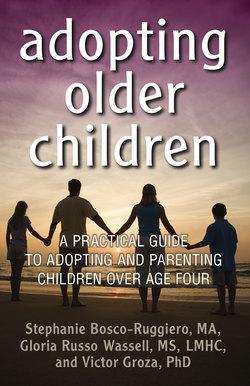Читать книгу Adopting Older Children - Stephanie Bosco-Ruggiero - Страница 15
На сайте Литреса книга снята с продажи.
ОглавлениеCHAPTER 5
Post-Adoption Services
Prior to adopting an older child, families should evaluate their support systems, noting in which areas they are lacking formal or informal support. Adoptive families should feel no shame in seeking out formal support and services. It is a typical need and families should seek help early and often.
Virginia Volante-Appel has over thirty years of experience as an adoption professional, including running her own agency and finding foster and adoptive homes for hard-to-place children. She says, “I think there is a lot of support out there for adoptive families now.” She tells new adoptive parents that love alone cannot solve every problem a child may have. “In the long run,” she tells them, “most mental health and attachment issues can be dealt with. [Adoptive parents] must have unconditional commitment no matter what happens. Kids have their own timelines—give them a chance.” She believes that, with adequate post-placement services and support, most older child adoptions can succeed.
It is evident that there are more post-adoption services available to families today than ever before. At one time, adoption agencies had little knowledge about the mental health problems and needs of older adoptees and therefore offered little support to families. Today, adoption professionals, policymakers, therapists, researchers and adoptive families themselves understand that families who adopt older children from foster care or from abroad need a range of specialized services and supports to help them succeed. A majority of the three hundred adoptive parents surveyed by the US Children’s Bureau for a report to Congress on barriers and success factors in adoption from foster care said they found post-placement training, therapy and support groups very helpful.1
The availability and quality of post-adoption services may vary by geographic location. Families living in rural areas may have less access to services than those living in urban areas. Furthermore, just because services are available does not mean families are aware of them or that they will access them. According to the Children’s Bureau report, 41 percent of the families surveyed said they had problems accessing post-placement services. A common barrier to accessing needed services noted by the families was a lack of insurance coverage.2
Post-adoption services may be available through the agency you choose, the state or a private organization. They may be free, covered by the child’s insurance or your insurance or you may have to pay out of pocket for some services. Families who are waiting for an adoption to be finalized should qualify for most if not all post-adoption services. Post-adoption services and benefits available to families who have adopted domestically or internationally may include:
• Follow-up home visits by the agency (requirements vary by state and adoption type)
• Mental health assessment and treatment
• Respite care
• Medical, dental and vision care
• Physical or occupational therapy
• Educational services
• Tuition reduction
• Crisis intervention
• Residential treatment
• Walk-in centers
Parents of children who are adopted from other countries may receive fewer post-placement services than parents of children adopted from the US foster care system. Public agencies can connect parents more easily with public services as compared to private agencies. Recurring public adoption subsidies are only available to families adopting domestically and other free services, such as mental health care, may only be available to these families as well. Parents of children who are adopted internationally should call their county or state child welfare agency to learn about services available to their child.
Those who adopt domestically will receive post-placement home visits by their adoption caseworker as required by state law, while parents who adopt internationally may not receive any face-to-face post-placement visits.
Parents who have adopted internationally may be required to submit regular post-placement reports to the country from which they adopted. Certain countries also require the agency to file post-placement reports. Ask your agency what post-placement reporting your country program requires. A mother who adopted her daughter from Ukraine described that country’s post-placement requirements:
For Ukraine we do not need any follow-up visits from a social worker but have to send yearly reports to the Ukrainian embassy for the first three years, then every three years after. Other countries have different requirements. Russia required visits and reports by a social worker at six months home, twelve months home and then every year after for the first three years home.
We received no financial support [for the adoption] from our government or from the Ukrainian government. We did some fundraising with Reece’s Rainbow [www.reecesrainbow.com] where people could donate to our adoption and many friends and family did this since we did not have a baby shower or anything. We also got money from my husband’s company when the adoption was finalized.
Additional post-placement support and services that may be available to families through their agencies include:
• Adoptive parent support groups
• Support groups for adopted children
• Culture camps
• Online discussion forums
• Mentors
• Parent training and education
• Special events
